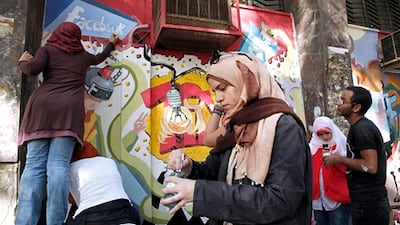Activists in Egypt have criticised a new dress code at a number of state universities before the new academic year.
Signs with the dress code appeared outside universities and were swiftly photographed by students and posted on social media. The rules include bans on clothes that are "too tight" and ripped, as well as distressed and see-through garments of any kind.
Shorts, flip-flops and leggings have also been banned.
The new regulations also outlawed galabeyas, a loose-fitting, one-piece garment traditionally worn by farmers in Egypt’s agricultural provinces.
The new academic year begins on October 2 and heralds other restrictions, including stricter controls on students bringing in weapons of any kind on to the campus. Flares and fireworks have also been banned.
Mahraganat music is also barred inside lecture halls, as are smoking, eating and drinking. The genre has been heavily criticised by the country's musicians' syndicate in the past for including inappropriate lyrics and glorifying a way of life that they say goes against the nation's customs.
The dress code was criticised by some rights activists, including president of the Egyptian Centre for Women's Rights, Nehad Aboul Komsan.
In an Instagram post, she said that although she agreed with the concept of educating Egypt's young people about better conduct, she was concerned that the new dress code was aimed at covering up female students. Meanwhile, she claims the sometimes indecent behaviour of male students has been left unaddressed.
She is also concerned about what she considers to be the new rules' vague wording.
"The new rules outlaw clothes that are too short or too tight, but who decides that? These matters cannot be left up to the ethical sensibilities of individual administrators at universities," Ms Aboul Komsan wrote.
"I sincerely hope that more work will be done to educate young men on what is deemed harassment on campus as well."
The higher education ministry responded on Saturday to the wave of criticism on social media regarding the new rules. It said it had the utmost trust in the ethics of Egypt’s students and their ability to choose clothes and behaviours that are appropriate for university campuses.
Although it did not deny the online criticism about the new regulations, the ministry warned students to use social media “rationally” and not to listen to “false or exaggerated news”.
Beni-Suef University president Dr Mansour Hassan said on Sunday night that because the government universities often comprised students from very different backgrounds, there had to be a unified dress code. He said this would ensure that differing ethical opinions did not result in conflicts on campus.
“I don’t think these rules are an encroachment on students’ personal freedoms," he told talk show host Lamees El Hadidy. "It’s a matter of respecting our university campus, which comprises 100,000 pupils from varying socio-economic backgrounds. If the student doesn’t understand the rules of common decorum, we have no problem teaching them that in a very slow and lenient way.”
Mahmoud Hamed, dean of the faculty of art education at Helwan University, Greater Cairo, said on Monday that “personal freedoms end when they start to impinge on the freedoms of the larger community”.
University students' conduct, particularly when it comes to sexes mixing, has been a matter of national debate since June. At this time, Nayera Ashraf, 21, a student at Mansoura University was murdered by a fellow student whose romantic advances she rejected.
Ashraf’s murder was filmed in its entirety and posted on social media — to the horror of the entire nation. Some more conservative commentators such as the former Al Azhar cleric, Mabrouk Attia, blamed the murder on the victim’s “provocative” clothing choices.
Less than two months after Ashraf’s murder, another university student, Salma Bahgat, 22, was also stabbed to death by a one of her classmates, whose advances she had similarly rejected.
Rowan Ayman, 21, a close friend of Ashraf's and a student at the faculty of arts at Mansoura University, told The National that the new rules had divided opinion among students.
But she said they were welcomed by concerned parents, many of whom considered pulling their daughters out of the university over safety concerns.
Ms Ayman also supports the increased regulation of students' conduct. She said that young women on her campus often had to deal with behaviour from male students which they deem to be inappropriate.
"I really think this is a step in the right direction, because on our campus, many male students ignore social decorum and behave in really shocking ways sometimes," she said. "I've personally seen them smoke hashish on multiple occasions, which makes me really uncomfortable as a girl who has to be around this kind of stuff."


